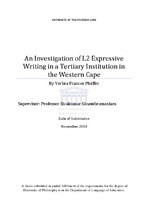An investigation of L2 expressive writing in a tertiary institution in the Western Cape
Abstract
This study investigates the use of expressive writing in the L2 classroom as the mainstay approach to help students improve their writing skills. This study focuses on literacy pedagogy as it is manifested in the understanding and experiences by tertiary L2 students engaging in the practice of expressive writing on a longitudinal basis. This qualitative case study design, guided by interpretive epistemology, was used to collect students’ views, perceptions, and suggestions on their experiences in writing. This study has been prompted by the fact that tertiary L2 students have a huge problem expressing themselves on paper. This study consists of two groups of students, one being the noticeable group and the other being the distinguished group. The aim of this study was to identify the kinds of strategies that could assist L2 students with English Language writing tasks. Academic writing requires a conscious effort and much practice in composing, developing, and analysing ideas. At a tertiary institution in the Western Cape, L2 students have the daunting task of not only dealing with new subjects at the university, but they also have to deal with writing in English which is a challenging endeavour for most them. This presents them with social and cognitive challenges related to second language acquisition. Since L2 students do not often consider the social contexts in which L2 academic writing takes place, models of L1 writing instruction and research on composing processes are often found wanting changes in their L2 writing pedagogy. In light of this, my study investigated the language proficiency and competence as the cornerstone of the ability to write in the L2 in a fundamental way. I not only used an
open-ended procedure in my classroom that promoted interaction in the classroom but also paved the way for contact between literature of daily living/evolutionary nature and experience. Strategy development and language skill development should be taken into account when working with L2 students. I used a descriptive design when dealing with the qualitative methodology and a verbal and written protocol analysis method to analyse my data. I conducted interviews with the 14 participating L2 students. My research questions were designed to investigate what instructional approaches motivated and engaged my participants to persist in successive writing performance. The findings suggest that the students benefited from the use of various activities to promote creative writing, tentative understanding, provisional interpretation and enjoyment of texts related to daily living. I believe that the exam score supports these indications. Based on the
low fail rate, I believe that literature of an evolutionary nature has motivated, challenged and encouraged students to gain confidence in their writing. When I ponder on the holistic view of my findings, this study endorses the use of expressive writing in the educational practice of expressive writing. Expressive writing as an educational practice can lay the ground work for students to become
better writers, thinkers and citizens.

